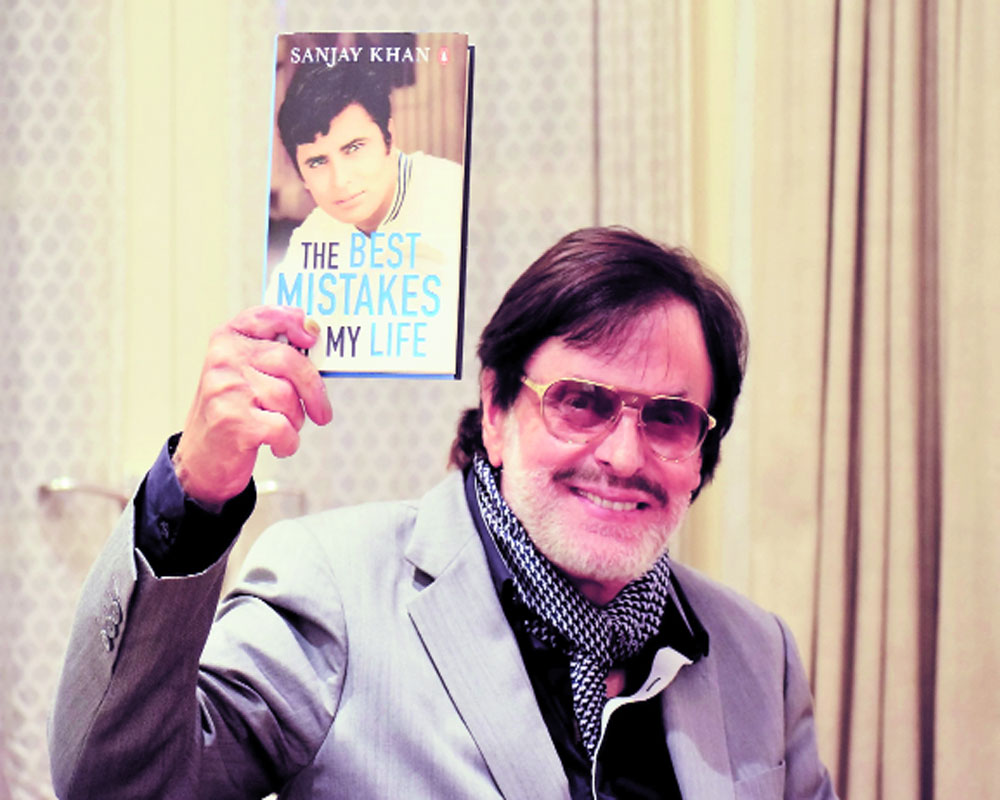Sanjay Khan | Miracle man,who rose from death after 65 per cent third degree burns and 73 surgeries, the 77-year-old Khan talks to Sangeeta Yadav about penning his extraordinary journey in his memoir The Best Mistakes Of My Life
What prompted you to write The Best Mistakes of My Life?
It was a fascinating journey. From becoming a star to having a wonderful family to the extraordinary experiences and adventures I have had and overcoming life threatening situations. Meeting some of the most powerful men in the world and becoming friends. All these stories have been some of the best mistakes of my life. My friends used to gather around me listening to stories and urged me to write a book before I forget. I agreed and worked towards it seriously.
Can you tell us an anecdote from your book?
I was in Iran to shoot a film in 1976 when I got a call from an assistant of a warlord who said that the chief was a fan of mine and would like to meet me. I accepted the invitation and took two flights along with a friend — George Masbetuny. We drove to the desert in the starry midnight and came to a large tent city. People received us and ushered us inside the tent which looked like a fairytale with Persian carpets, chandeliers, a centre table with a wide spread of fruits and snacks to eat. We were wondering what type of Khan he was. A bearded one with a black robe and turban in a typical Iranian style. I oppose to meeting religious people, so I was hoping that he would not be one.
Isn’t that dramatic?
Suddenly, from the wings, like an actor enters the stage, a 35-year-old man came out wearing turtle neck black sweater and say, ‘Hi, I am the Khan’ (laughs). We embraced each other and sat down. He called his four wives and said: ‘They are your big fans and they are going to sing a song.’ I was delighted. The eldest was about 25 and the youngest was about 16- year, all dressed in long Qashqai tribe gowns. They played mandolin and sang so beautifully. Khan was looking at me and I was looking at the ladies. When I noticed that Khan is watching me, he said: “You can look at the first three but not the youngest, she is my favourite (laughs).” It was such an amusing experience. He was liberal, honest and my regard for this man went up. What happened later, one will have to read the book. There are more such interesting anecdotes.
How has your relationship been with your family?
Once a banker asked me my net worth and I just smiled and said, ‘take a head count of my wife, four children, three son-in-laws, nine grandchildren and one daughter-in-law. Attach a figure on each and you will get the total. That is my net worth’. That is how much my family means to me and I am not overtly concerned with the ups and downs of the material world.
What is the best thing that has happened in your life?
Zarine! I am very grateful to have her in my life. I, as a husband and father, have fulfilled my duties. My children have received a good education and learnt to be patient, to respect the elders and help the weak and the poor. This may sound to you like any standard parent, but all this was taught to me by my parents. I still remember my mother’s words, she said: ‘Son, you God’s hand. You must help people’.
How was the phase like when you met with a fire accident during the shoot of The Sword of Tipu Sultan?
It is easy for one to imagine, but to experience 65 per cent third degree burns, the trauma of 13 months and 73 surgeries was difficult. That time, I felt like a insect trapped in a deep circular space and I just wanted to come out a little hole which was like a window from where the light was coming in. I kept telling myself that I must fly out. The treating doctors in the US said perhaps I am the only man in a billion who can be described as a miracle. That’s why they used to call me The Miracle Man.
How has the Bollywood journey been?
It has been very fruitful. I was very popular at one time and everybody wanted to work with me. When I was labeled as the most handsome actor in the industry, I used to look into the mirror and say to myself: ‘These guys are pulling my leg’. Even after my recovery, I never stopped working. One thought which kept me going was one should put the heart in whatever they do, and the body will follow.

























